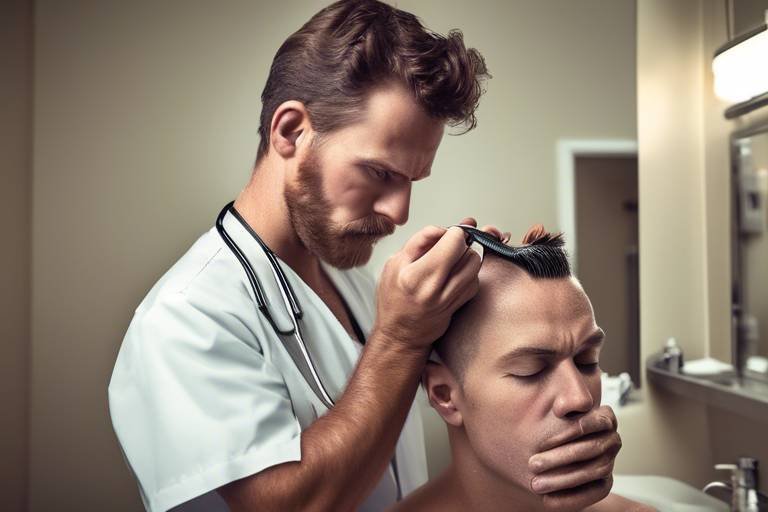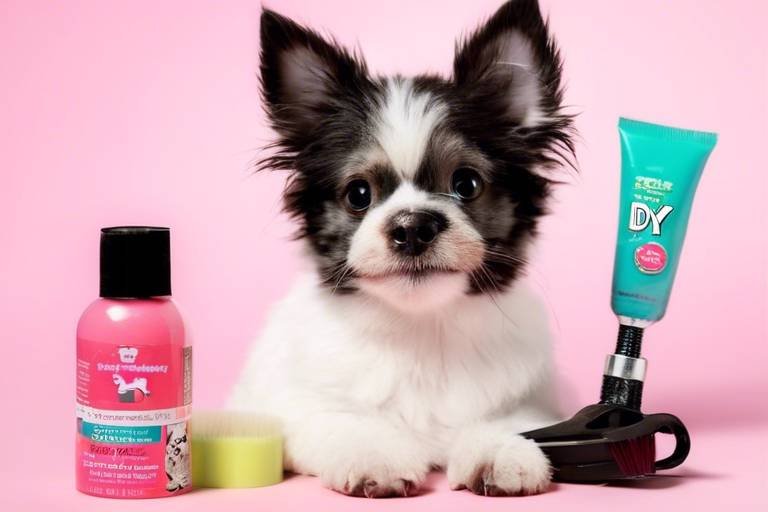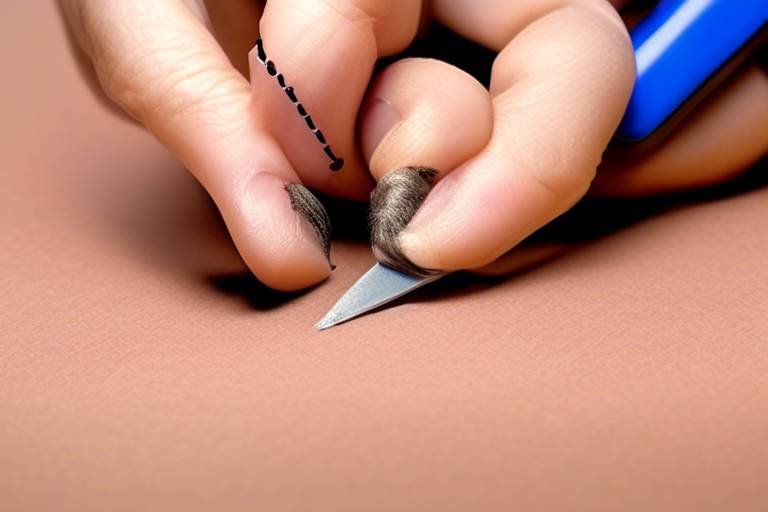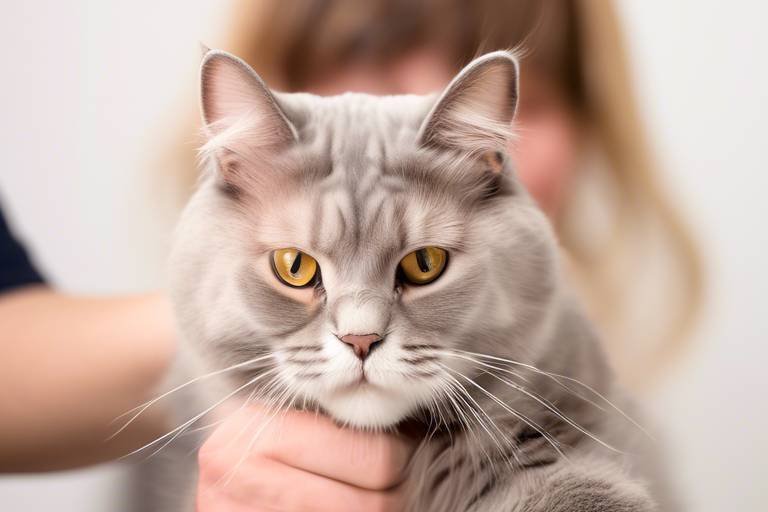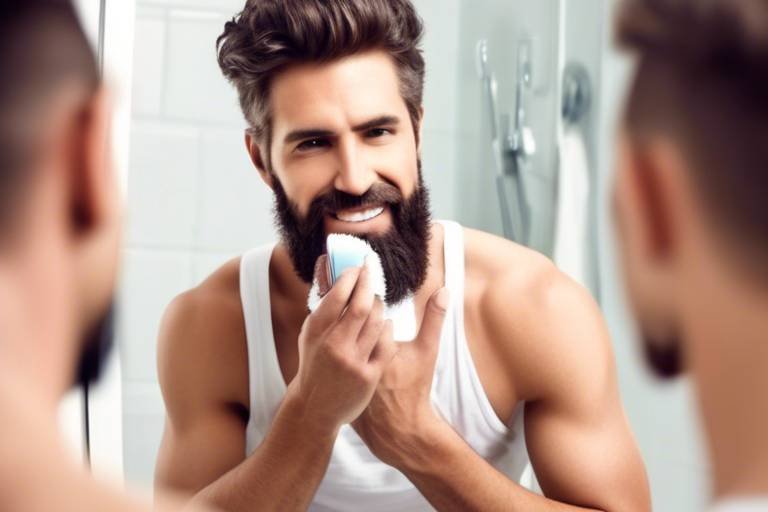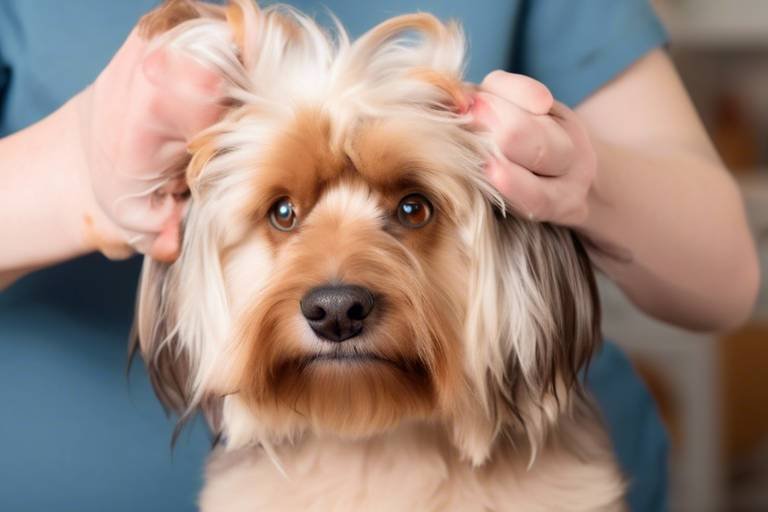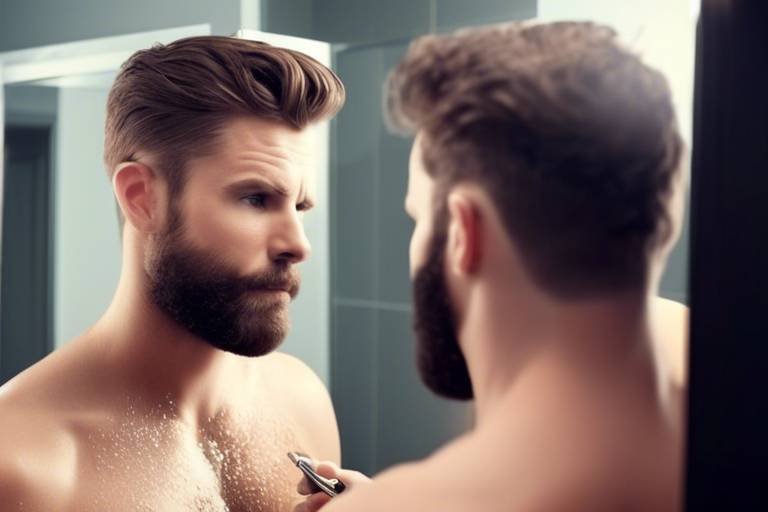The Importance of Grooming for Preventative Health Care
When we think about health care, our minds often jump to doctors, medications, and maybe even the gym. But have you ever considered that grooming plays a critical role in your overall health? Yes, you heard that right! Regular grooming is not just about looking good; it’s about feeling good and staying healthy. In fact, grooming can be a powerful tool for disease prevention, maintaining hygiene, and even boosting your mental health. It’s like having a personal health shield that protects you from various ailments while enhancing your self-esteem.
Imagine this: you wake up in the morning, and instead of rushing through your routine, you take a moment to care for yourself. You wash your face, brush your teeth, and maybe even apply some moisturizer. These small acts are more than just rituals; they are steps toward a healthier you. Grooming helps you spot potential health issues early on, from skin problems to dental issues, which can save you a lot of trouble down the road.
Moreover, grooming is a form of self-care. It’s that little slice of time you carve out for yourself amidst the chaos of daily life. When you engage in grooming practices, you’re not just enhancing your appearance; you’re also sending a message to yourself that you matter. This can lead to improved mental health, as you start to feel more confident and in control. So, let’s dive deeper into the world of grooming and uncover how it can significantly impact your health and well-being!

Understanding Grooming
Grooming is more than just a routine; it’s an essential practice that plays a pivotal role in maintaining our overall health and appearance. When we think of grooming, we often picture activities like haircuts, shaving, or applying makeup. However, grooming encompasses a much broader spectrum of practices aimed at enhancing personal hygiene and self-presentation. Understanding its significance can help individuals appreciate how grooming contributes to preventative health care.
At its core, grooming involves a variety of tasks that keep our bodies clean and our appearances polished. This includes everything from bathing and skincare to oral hygiene and nail care. Each of these elements contributes not just to how we look, but also to how we feel. For instance, taking a few moments each day to cleanse your face and apply moisturizer can do wonders for your skin's health, preventing issues like dryness or acne. Similarly, regular brushing and flossing can keep your teeth healthy and your smile bright, which ultimately affects your confidence and social interactions.
Moreover, grooming practices can serve as a **preventative measure** against various health issues. For example, neglecting personal hygiene can lead to skin infections, while poor oral hygiene can result in dental problems that may affect overall health. It’s essential to recognize that grooming is not merely a cosmetic endeavor; it’s a critical component of a healthy lifestyle. By prioritizing grooming, we can not only enhance our physical appearance but also safeguard our health.
To fully grasp the importance of grooming, consider its role in fostering a sense of well-being. Engaging in grooming routines can be incredibly therapeutic, providing a moment of self-care in our busy lives. The act of taking care of oneself can boost mood and self-esteem, creating a positive feedback loop that encourages further healthy behaviors. In this way, grooming is not just about looking good; it's about feeling good, both physically and mentally.
In summary, understanding grooming is about recognizing its multifaceted nature. It’s not merely a series of tasks, but rather a holistic approach to health and wellness. By embracing grooming as an integral part of our daily lives, we can enhance our physical health, improve our mental well-being, and ultimately lead happier, healthier lives.

Physical Health Benefits
When we think about grooming, we often picture a quick shave or a stylish haircut, but the of grooming extend far beyond mere aesthetics. Regular grooming practices can significantly improve your overall health by preventing various health issues. For instance, maintaining cleanliness through grooming can help to avoid skin infections, dental problems, and even more serious health concerns. Imagine your skin as a protective barrier; if it's not well cared for, it can become a gateway for bacteria and other harmful elements. Grooming acts as a shield, fortifying your body's defenses.
One of the most direct impacts of grooming on physical health is through skin care practices. Proper cleansing and moisturizing can prevent common conditions such as acne and dermatitis. For example, if you regularly cleanse your face, you're not just removing dirt and oil; you're also minimizing the chances of clogged pores that can lead to breakouts. Moisturizing, on the other hand, keeps your skin hydrated and prevents dryness, which can cause irritation and other skin issues. It's like watering a plant; without the right care, it wilts and suffers.
To truly grasp the importance of skin care, consider the following essential routines that can enhance your health:
- Daily Cleansing: Wash your face twice a day to remove impurities.
- Moisturizing: Use a suitable moisturizer after cleansing to maintain hydration.
- Sun Protection: Apply sunscreen daily to prevent sun damage, which can lead to skin cancer.
Moreover, conducting regular skin inspections is crucial. By taking a few minutes each week to examine your skin for any unusual changes, you can catch potential problems early. Early detection can lead to more effective treatments, much like spotting a leak in your roof before it turns into a flood. Ignoring these signs can result in more severe health issues down the line, so make it a habit to check your skin regularly.
When you perform skin inspections, you're essentially taking a proactive approach to your health. Look for changes in moles, spots, or any new growths. If something seems off, don’t hesitate to consult a healthcare professional. This habit not only empowers you but also reinforces the idea that your health is in your hands.
In addition to routines, selecting the right grooming products is essential for maintaining skin health. With a myriad of options available, it can be overwhelming to choose the best products for your skin type. Here are some tips:
- Know Your Skin Type: Identify if your skin is oily, dry, combination, or sensitive.
- Read Labels: Look for products that are free from harsh chemicals and are suitable for your specific needs.
- Patch Test: Always conduct a patch test when trying a new product to prevent adverse reactions.
Similarly, oral hygiene is another vital aspect of grooming that directly impacts your physical health. Regular dental care, including brushing and flossing, helps to prevent cavities, gum disease, and even heart disease. Think of your mouth as the gateway to your body; if it’s not healthy, it can lead to a cascade of health issues. So, don’t underestimate the power of a good toothbrush!
In summary, grooming is not just about looking good; it’s a fundamental part of maintaining your physical health. By adopting a consistent grooming routine that includes skin care, regular inspections, and oral hygiene, you can significantly enhance your overall well-being. Remember, taking care of yourself is not a luxury; it’s a necessity!
Skin Care Practices
When it comes to maintaining healthy skin, the practices you adopt can make a world of difference. Think of your skin as a protective barrier, much like a shield that guards your body from external aggressors such as pollution, bacteria, and harmful UV rays. To keep this shield in tip-top shape, it's crucial to develop a robust skin care routine. So, what does that entail? It’s not just about slapping on some moisturizer and calling it a day; it involves a series of thoughtful steps that cater to your skin's specific needs.
First and foremost, cleansing is a non-negotiable step in any skin care regimen. Imagine washing away the day’s dirt and grime, much like rinsing off the dust from a car after a long drive. A good cleanser can help remove impurities, excess oil, and makeup, setting the stage for the rest of your routine. It's essential to choose a cleanser that suits your skin type—whether it's oily, dry, or sensitive. For instance, those with oily skin might benefit from a foaming cleanser, while individuals with dry skin should opt for a creamy formula that hydrates as it cleans.
Next up is moisturizing. Just like a thirsty plant needs water, your skin craves hydration. A quality moisturizer not only keeps your skin supple but also helps to lock in moisture, preventing dryness and flakiness. It's particularly important to apply moisturizer right after cleansing when your skin is still damp, as this helps to seal in that precious moisture. You might also consider using a serum packed with beneficial ingredients like hyaluronic acid or vitamin C to give your skin an extra boost.
Additionally, don’t underestimate the power of exfoliation. Think of it as spring cleaning for your face! Regular exfoliation helps to slough off dead skin cells, revealing the fresh, radiant skin underneath. However, moderation is key; over-exfoliating can lead to irritation and sensitivity. Aim for exfoliating 1-2 times a week, depending on your skin’s tolerance.
Lastly, let’s not forget about sun protection. Applying sunscreen daily is as vital as brushing your teeth. UV rays can cause premature aging and increase the risk of skin cancer, so it’s crucial to incorporate a broad-spectrum SPF into your routine. Even on cloudy days, UV rays can penetrate through the clouds, so make it a habit to apply sunscreen every morning, regardless of the weather.
In summary, a well-rounded skin care routine can significantly enhance your skin's health and appearance. By incorporating cleansing, moisturizing, exfoliating, and sun protection into your daily regimen, you can keep your skin looking vibrant and youthful. Remember, your skin is unique, so pay attention to what works best for you and adjust your routine as needed.
- How often should I cleanse my face? - Ideally, you should cleanse your face twice a day, once in the morning and once before bed.
- Can I skip moisturizer if I have oily skin? - No, even oily skin needs hydration. Look for lightweight, non-comedogenic moisturizers.
- What type of exfoliator should I use? - Choose a gentle exfoliator that suits your skin type; chemical exfoliants can be less abrasive than physical ones.
- Is sunscreen necessary in winter? - Absolutely! UV rays can harm your skin year-round, so daily sunscreen is a must.
Importance of Regular Inspections
When it comes to grooming, one of the often-overlooked aspects is the importance of regular inspections of your skin and body. Think of it as a routine check-up for your skin, similar to how you would visit a doctor for a health assessment. Regular inspections can be a game-changer in identifying potential issues before they escalate into serious problems. Just as you wouldn’t ignore a strange noise coming from your car, you shouldn’t ignore changes in your body.
Performing regular inspections allows you to become familiar with your own body and its patterns. By doing so, you can easily spot any abnormalities or changes that could indicate a health issue. For instance, if you notice a new mole or a change in the appearance of an existing one, it’s essential to consult a healthcare professional. Early detection is key; many skin conditions and diseases, such as skin cancer, are highly treatable when caught early.
Moreover, these inspections can serve as a preventive measure. Just as you wouldn’t wait for your car to break down before getting an oil change, you shouldn’t wait for symptoms to appear before checking your skin. Regularly examining your skin can help you maintain your health and well-being. Here are some essential steps to consider during your inspections:
- Look for Changes: Check for any new growths, moles, or changes in existing ones.
- Examine Skin Texture: Notice any rough patches or changes in texture that weren’t there before.
- Monitor Color Changes: Pay attention to any discoloration or unusual spots.
Additionally, keep in mind that grooming isn’t just about aesthetics; it’s about taking charge of your health. By incorporating inspections into your grooming routine, you’re sending a message to yourself that you care about your body and overall health. Remember, the skin is the largest organ we have, and it deserves just as much attention as any other part of our body.
In conclusion, regular inspections are not merely a grooming task but a vital part of preventative health care. They empower you with knowledge about your body and help you catch potential health issues early. So, the next time you’re grooming, take a moment to inspect your skin. It’s a small investment of time that can lead to significant health benefits down the road.
Q1: How often should I perform skin inspections?
A1: It's recommended to conduct skin inspections at least once a month. This frequency allows you to notice any changes or abnormalities in your skin over time.
Q2: What should I do if I find something unusual during my inspection?
A2: If you notice any suspicious changes, such as a new mole or a change in an existing one, it’s important to consult a healthcare professional as soon as possible for further evaluation.
Q3: Can grooming routines help with early detection of health issues?
A3: Absolutely! Regular grooming and inspections can help you become more aware of your body, allowing you to spot changes that may indicate health concerns.
Choosing the Right Products
When it comes to grooming, the products you choose can make a world of difference in your skin's health and overall appearance. Think of your skin as a canvas; using the right products is like selecting the best paints to create a masterpiece. But how do you know which products are right for you? It can feel overwhelming with so many options available on the market, but understanding your skin type and needs is the first step in making informed choices.
To begin with, it's essential to identify your skin type. Is it oily, dry, combination, or sensitive? Each type has specific needs, and using products tailored to your skin can prevent issues like irritation or breakouts. For instance, if you have oily skin, look for products labeled as "oil-free" or "non-comedogenic," which means they won't clog your pores. On the other hand, if your skin tends to be dry, opt for rich moisturizers that contain ingredients like hyaluronic acid or glycerin to help retain moisture.
Moreover, consider the ingredients in your grooming products. Natural ingredients are often gentler on the skin and can provide additional benefits. For example, aloe vera is renowned for its soothing properties, while tea tree oil is celebrated for its antibacterial qualities. Here's a quick breakdown of some beneficial ingredients:
| Ingredient | Benefits |
|---|---|
| Aloe Vera | Soothes and hydrates the skin |
| Tea Tree Oil | Antibacterial and anti-inflammatory |
| Glycerin | Locks in moisture |
| Salicylic Acid | Helps prevent acne |
Another vital aspect of choosing the right products is to perform a patch test, especially if you have sensitive skin. Apply a small amount of the product on your wrist or behind your ear and wait for 24 hours to see if any reaction occurs. This simple step can save you from potential skin troubles down the line.
Lastly, don’t forget to consider the brand's reputation. Researching brands that prioritize quality and transparency can lead you to products that are both effective and safe. Look for brands that share their ingredient sourcing and manufacturing processes; this transparency often indicates a commitment to quality and consumer safety.
In summary, choosing the right grooming products is not just about picking the latest trendy item; it’s about understanding your skin's unique needs and making informed decisions. By investing a little time in learning about your skin type, examining product ingredients, and performing patch tests, you can create a grooming routine that enhances your skin's health and appearance. Remember, your skin is your largest organ, so treat it with the care it deserves!
Oral Hygiene and Grooming
Oral hygiene is a crucial aspect of grooming that often gets overshadowed by other beauty and hygiene routines. However, neglecting your oral health can lead to serious health issues beyond just bad breath or cavities. Think of your mouth as the gateway to your overall health; if this gateway is not well-maintained, it can lead to a cascade of problems that affect your entire body. Just like you wouldn't ignore a leaky faucet in your home, you shouldn't overlook the importance of your dental care.
Regular dental care is essential not only for maintaining a bright smile but also for preventing diseases. Poor oral hygiene can result in gum disease, tooth decay, and even systemic conditions such as heart disease and diabetes. The mouth is home to millions of bacteria, and without proper care, these bacteria can multiply and lead to infections. Therefore, incorporating effective oral hygiene practices into your grooming routine is not just a cosmetic concern but a vital part of your overall health strategy.
To keep your mouth healthy, consider the following essential practices:
- Brushing Twice Daily: Use a fluoride toothpaste and a soft-bristled toothbrush to brush your teeth at least twice a day. This helps remove plaque, the sticky film of bacteria that forms on your teeth.
- Flossing: Flossing daily is crucial for removing food particles and plaque from between your teeth where your toothbrush can't reach. This step is often overlooked, yet it's vital for preventing gum disease.
- Regular Dental Check-Ups: Schedule visits to your dentist at least twice a year for professional cleanings and check-ups. These appointments can catch potential issues early, saving you from costly treatments later on.
Moreover, choosing the right products can significantly enhance your oral hygiene routine. For instance, consider using an electric toothbrush, which can be more effective at reducing plaque than a manual one. Additionally, mouthwashes containing antibacterial properties can help in reducing oral bacteria, leading to fresher breath and healthier gums.
In summary, oral hygiene is an integral part of grooming that contributes significantly to your overall health. By maintaining a consistent oral care routine, you not only ensure a radiant smile but also safeguard your body against various health complications. Remember, a healthy mouth is a happy mouth, and it can make a world of difference in how you feel about yourself and how others perceive you.
Q: How often should I visit the dentist?
A: It is generally recommended to visit the dentist at least twice a year for regular check-ups and cleanings.
Q: Can poor oral hygiene affect my overall health?
A: Yes, poor oral hygiene can lead to serious health issues, including heart disease, diabetes, and respiratory infections.
Q: What is the best way to maintain oral hygiene?
A: The best way to maintain oral hygiene is to brush your teeth twice a day, floss daily, and visit your dentist regularly.
Q: Are electric toothbrushes better than manual ones?
A: Many studies suggest that electric toothbrushes can be more effective at reducing plaque and gingivitis compared to manual toothbrushes.

Mental Health Benefits
Grooming is often seen as a superficial activity, something we do to look presentable to the outside world. However, it goes far beyond that! Engaging in regular grooming routines can significantly enhance our mental wellbeing. Think about it: when you look good, you often feel good too. This connection between grooming and mental health is profound and deserves exploration.
One of the most notable mental health benefits of grooming is the boost in self-esteem it can provide. When you take the time to groom yourself, whether it’s through a fresh haircut, a new skincare routine, or simply putting on your favorite outfit, you send a message to yourself that you care. This act of self-care can transform your self-image, making you feel more confident and ready to tackle the day. It's like putting on armor before heading into battle; you feel invincible!
Moreover, grooming can serve as a powerful form of stress relief. In our fast-paced lives, we often forget to take a moment for ourselves. Engaging in grooming routines can provide a much-needed break, allowing us to focus solely on our own needs. Picture this: the soothing sensations of washing your face, the calming effect of applying moisturizer, or the joy of styling your hair just right. These moments of self-care can be incredibly therapeutic, helping to reduce stress and promote relaxation.
Consider this: grooming can also create a sense of routine and structure in our lives, which is particularly beneficial during times of uncertainty or chaos. Establishing a grooming routine can provide a sense of normalcy and control. When everything else feels unpredictable, having a consistent grooming schedule can ground you. It’s like having a compass that helps you navigate through the stormy seas of life.
Additionally, the social aspect of grooming cannot be overlooked. Engaging in grooming practices can enhance our interactions with others, leading to improved social connections. When we feel good about ourselves, we are more likely to engage positively with those around us. This can create a ripple effect, enhancing not only our mental health but also the wellbeing of those we interact with. After all, happiness is contagious!
In summary, the mental health benefits of grooming are multifaceted and profound. From boosting self-esteem to providing stress relief, grooming routines play a crucial role in enhancing our overall mental wellbeing. So, the next time you pick up that hairbrush or lather on some moisturizer, remember that you’re not just beautifying your exterior; you’re nurturing your mind and spirit as well.
- How often should I groom myself for mental health benefits?
It varies from person to person, but establishing a routine that feels good to you—whether daily or weekly—can enhance your mental wellbeing. - Can grooming help with anxiety?
Yes! Engaging in grooming can be a calming ritual that helps reduce feelings of anxiety and promotes relaxation. - What grooming practices are best for boosting self-esteem?
Practices like skincare, haircare, and dressing well can significantly impact your self-image and confidence.
Boosting Self-Esteem
Engaging in regular grooming routines can significantly enhance your self-image and confidence. Think about it: when you look good, you often feel good too. This connection between appearance and self-esteem is not just a superficial notion; it’s deeply rooted in our psychology. When you take the time to groom yourself, whether that means styling your hair, dressing nicely, or simply practicing good hygiene, you send a powerful message to yourself and the world around you. You are worthy of care and attention, and this can lead to a transformation in how you view yourself.
Moreover, grooming acts as a form of self-expression. It allows you to showcase your personality and individuality. Choosing the right outfit, accessorizing, or even experimenting with different hairstyles can be exhilarating! This creative aspect of grooming can lead to a sense of accomplishment and pride, further contributing to an elevated self-esteem. Imagine walking into a room, feeling confident in your appearance, and noticing how others respond positively to your vibe. It’s like wearing an invisible crown that boosts your spirit and makes you feel on top of the world!
But let’s take a moment to break down the psychological benefits of grooming. Here are some key ways grooming can boost your self-esteem:
- Improved Body Image: Regular grooming helps you feel more in control of your appearance, leading to a more positive body image.
- Positive Feedback: Compliments from others about your grooming can reinforce your self-worth and make you feel appreciated.
- Routine and Discipline: Establishing a grooming routine fosters a sense of discipline and accomplishment, which can translate into other areas of your life.
Additionally, grooming can be a powerful tool in social settings. When you feel good about how you present yourself, you are more likely to engage with others confidently. This can lead to new friendships, professional opportunities, and enriching experiences. Think of grooming as your personal armor; it prepares you to face the world with a smile and an open heart.
In conclusion, the act of grooming transcends mere appearance; it is a vital practice that nurtures our self-esteem and mental well-being. By investing time in our grooming routines, we not only enhance our outward appearance but also cultivate a positive inner dialogue that reinforces our self-worth. So, the next time you pick up that hairbrush or apply your favorite moisturizer, remember that you are doing more than just grooming – you are empowering yourself!
1. How often should I groom myself to see benefits?
It's recommended to establish a grooming routine that fits your lifestyle. Regular grooming, whether daily or weekly, can lead to noticeable improvements in your self-esteem and overall hygiene.
2. Can grooming really affect my mental health?
Absolutely! Regular grooming can enhance your self-image, leading to increased confidence and reduced stress levels. It’s a form of self-care that promotes mental well-being.
3. What are some simple grooming habits I can start with?
You can start with basic habits such as daily showering, maintaining oral hygiene, and keeping your hair styled. Gradually, you can add more personalized grooming practices to your routine.
4. Is grooming important for everyone?
Yes! Grooming is beneficial for everyone, regardless of age or gender. It plays a crucial role in maintaining hygiene, health, and self-esteem.
Stress Relief Through Grooming
In our fast-paced world, finding moments of tranquility can feel like searching for a needle in a haystack. However, one of the simplest yet most effective ways to unwind is through a regular grooming routine. Engaging in grooming activities, whether it's a refreshing shower, a relaxing facial, or simply styling your hair, can serve as a powerful form of self-care. These routines not only enhance our physical appearance but also provide a much-needed escape from the daily grind. Think of grooming as a mini-vacation for your mind; it’s a chance to hit pause and focus solely on yourself.
When we take the time to groom ourselves, we create a moment of peace and reflection. This process can be incredibly therapeutic. For instance, the act of lathering up with your favorite shampoo or applying a soothing moisturizer can transform a mundane task into a sensory experience. The scents, textures, and rituals involved in grooming can stimulate our senses and elevate our mood. It’s like giving yourself a gentle hug, reminding you that you deserve care and attention.
Moreover, grooming can significantly reduce stress levels. According to various studies, self-care practices—including grooming—release endorphins, the body's natural feel-good hormones. When we engage in these activities, we not only improve our appearance but also foster a positive mindset. It’s a win-win situation! Here’s how grooming can help alleviate stress:
- Mindfulness: Grooming encourages us to be present in the moment, allowing us to focus on the here and now rather than the worries of tomorrow.
- Routine and Structure: Establishing a grooming routine can provide a sense of stability and control, which is especially comforting during chaotic times.
- Physical Touch: The act of caring for your body through grooming promotes a sense of well-being, as physical touch can be incredibly soothing.
Additionally, the confidence boost that often comes from grooming cannot be overstated. When we look good, we feel good! This enhanced self-image can lead to increased confidence, which can further help mitigate stress. Imagine walking into a room feeling fresh and put together; that self-assuredness can change your entire outlook on the day ahead.
Incorporating grooming into your daily routine doesn’t have to be a chore. It can be an enjoyable ritual that you look forward to. Whether it’s indulging in a luxurious bubble bath, giving yourself a manicure, or simply taking a moment to style your hair, these small acts can have a profound impact on your mental health. So, the next time you feel overwhelmed, consider taking a few moments to pamper yourself. After all, you deserve it!
Q1: How often should I groom myself for stress relief?
A1: The frequency of grooming can vary from person to person, but establishing a daily routine can be beneficial. Even small daily grooming practices can significantly impact your mental well-being.
Q2: What types of grooming activities are best for stress relief?
A2: Activities like taking a warm bath, practicing skincare, or even styling your hair can be incredibly soothing. Choose what feels best for you!
Q3: Can grooming help with anxiety?
A3: Yes! Engaging in grooming can serve as a grounding activity that helps distract from anxious thoughts and promotes relaxation.
Q4: Is it necessary to use special products for stress-relief grooming?
A4: While special products can enhance the experience, what matters most is finding a routine that you enjoy and that makes you feel good.

Developing a Grooming Routine
Establishing a consistent grooming routine is not just about looking good; it's a vital part of maintaining your overall health and wellbeing. Think of it as your personal health ritual—a time you dedicate to yourself, where you can check in and ensure everything is in order. But how do you create a routine that works for you? The key is to keep it simple, manageable, and tailored to your specific needs. Here are a few steps to consider when crafting your ideal grooming regimen.
First, identify the core grooming tasks essential for your daily life. This might include washing your face, brushing your teeth, showering, and taking care of your hair and nails. The beauty of grooming is that it can be customized. For some, this might mean adding a skincare routine, while for others, it might involve regular haircuts or manicures. The goal is to create a routine that feels natural and enjoyable, rather than a chore.
Next, consider the frequency of these tasks. Some people may find that they need to wash their hair every day, while others can stretch it to once or twice a week. It’s all about finding what works for your body and lifestyle. For example, if you exercise frequently, you might want to shower daily. On the other hand, if you have dry skin, less frequent washing might be beneficial. Listen to your body and adjust accordingly.
Additionally, time management plays a crucial role in developing your grooming routine. Set aside specific times during the day or week for your grooming tasks. This could be as simple as spending 10 minutes each morning on skincare or dedicating a Sunday afternoon to a more extensive grooming session, including hair treatments and nail care. Having a set schedule can help you stay consistent and ensure that you never skip your important self-care rituals.
Finally, don't forget to reassess your routine periodically. As your lifestyle changes—whether due to a new job, a shift in your health, or even the changing seasons—your grooming needs may evolve as well. Take the time to reflect on what’s working and what isn’t. This ensures that your grooming routine remains effective and enjoyable over time.
Incorporating these elements into your grooming routine can transform it into a powerful tool for maintaining not just your appearance, but also your health and happiness. Remember, grooming is not just about looking presentable; it’s about feeling good in your skin and taking proactive steps toward your wellbeing.
- How often should I groom? It varies from person to person, but establishing a daily routine for basic tasks and a weekly schedule for more intensive grooming can be effective.
- What if I have sensitive skin? Choose products that are specifically designed for sensitive skin and consider consulting a dermatologist for personalized recommendations.
- Can grooming improve my mood? Absolutely! Regular grooming can boost self-esteem and serve as a form of self-care, which can positively impact your mental health.
- Is it necessary to have a grooming routine? While it’s not mandatory, a grooming routine can help you maintain hygiene, prevent health issues, and enhance your overall wellbeing.
Frequently Asked Questions
- What is the importance of grooming in preventative health care?
Grooming plays a crucial role in preventative health care by maintaining hygiene and preventing various health issues. Regular grooming can help ward off skin infections, dental problems, and other health concerns, ultimately contributing to overall wellbeing.
- How can regular grooming improve physical health?
Regular grooming improves physical health by reducing the risk of infections and promoting cleanliness. For example, consistent skin care routines can prevent conditions like acne and dermatitis, while maintaining oral hygiene can prevent dental issues that might lead to more serious health problems.
- What are some essential skin care practices?
Essential skin care practices include daily cleansing, moisturizing, and conducting regular skin inspections. These routines help maintain skin health and can lead to the early detection of any abnormalities, making treatment more effective.
- How do I choose the right grooming products?
Choosing the right grooming products is about understanding your skin type and specific needs. Look for products formulated for your skin type, check for any allergens, and consider consulting a dermatologist for personalized recommendations.
- What role does oral hygiene play in grooming?
Oral hygiene is a vital aspect of grooming that directly impacts overall health. Regular brushing, flossing, and dental check-ups can prevent cavities, gum disease, and other oral health problems, which in turn can affect your general health.
- How can grooming benefit mental health?
Grooming can significantly boost mental health by enhancing self-esteem and promoting relaxation. Engaging in grooming routines can make you feel more confident and improve your mood, serving as a form of self-care that reduces stress.
- What are some tips for developing a grooming routine?
To develop a grooming routine, start by identifying the grooming tasks that are most important to you. Create a manageable schedule that includes daily, weekly, and monthly tasks, and stick to it to ensure you reap the health benefits of consistent grooming.

